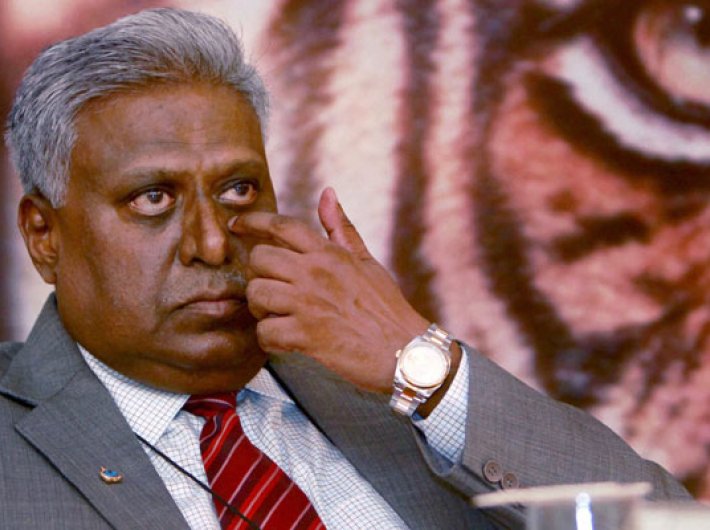TN officer Archana Ramasundaram may end up becoming expedient in ego clash between CBI chief Ranjit Sinha and home secretary Anil Goswami
Remember the metaphor “caged parrot” the supreme court used to describe the country's premier investigative agency, the central bureau of investigation (CBI)? The apex court pitched for CBI's autonomy when it was disgusted by the agency’s pusillanimity before its political masters following the revelation that documents related to the coal scam were perused and amended by then law minister Ashwani Kumar before submission in court.
But the controversy related to the posting of CBI additional director Archana Ramasundaram shows that the agency has further tied itself up in knots.
Since the issue is in the apex court and it concerns the compliance of rules and norms, it would be interesting to recount the story of Ramasundaram’s posting and resultant bureaucratic chaos, and the bruised larger-than-life egos of individual officers.
In a meeting of the central vigilance commission (CVC) board in September 2013, union home secretary Anil Goswami proposed the name of RK Pachnanda, a 1983 batch IPS officer of West Bengal cadre, for the post of CBI additional director.
Insiders say Pachnanda’s name provoked strong reaction from CBI chief Ranjit Sinha, who raised doubts about the officer’s credentials. In Sinha’s view, Pachnanda’s previous record in the agency was unsavoury. He insisted on inducting Ramasundaram, a 1981 batch IPS officer of Tamil Nadu cadre with impeccable record, for the vacancy.
The meeting saw an unusual spat between the home secretary and the CBI chief over the choice of their nominees.
So, how did Pachnanda’s induction in the CBI become a prestige issue for Goswami? The reason is not far to seek. Pachnanda was believed to have used his influence with several top officers, including a retired home secretary currently posted as governor in a northeastern state, to get the CBI posting. Even the CBI chief was approached from different quarters on several occasions.
Given Pachnanda’s tendency to throw his weight around, the CBI chief was wary of having him in an important position. Moreover, there was a confidential noting on Pachnanda’s existing file in the CBI by a previous director, which said Pachnanda did not deserve to be posted in the agency. All this combined to firm up Sinha’s view against Pachnanda. However, the home secretary was equally vehement in having the officer posted in the agency. He contended that charges of misdemeanour against Pachnanda did not stand scrutiny.
That Pachnanda wields considerable clout in top echelons of the administration was demonstrated when the CVC board, which selects officers for CBI postings, brushed aside Sinha’s objections and recommended his name. Since the posting needed to be cleared by the appointments committee of the cabinet (ACC), the matter was referred to the PMO for final approval.
An indignant Sinha then approached the PMO, registered his strong objections over the move, and requested the ACC to withhold its consent. The matter was subsequently referred to solicitor general Mohan Parasaran who explained that the ACC had power to overrule the CVC board’s recommendation and select another officer from the shortlisted panel.
The ACC thus zeroed in on Ramasundaram.
What is curious is that the Tamil Nadu government initially recommended Ramasundaram’s name but held it back in the final stage.
The J Jayalalithaa government had initially given the no-objection certificate for considering Ramasundaram’s candidature for the CBI posting. But the moment the ACC cleared her name, the state government’s permission was withheld in an inexplicable manner for four months, prompting the union government to exercise its residual constitutional powers to direct Ramasundaram to take up her new assignment as additional director of CBI. This clearly marked the CBI chief’s victory over the home secretary.
But what had started as a small battle turned into a full-fledged administrative war. The Tamil Nadu government sacked Ramachandran for taking up the CBI assignment without its approval. Significantly, with the change of guard at the Centre after the elections, the Modi government was not morally bound to defend the decision of the previous government, which is being reviewed by the SC.
On Thursday (July 17), Ramasundaram pleaded before the apex court that she had abided by the government's order in joining the new assignment. Apparently she is not the only officer transferred by the Centre without the state government’s consent. Kuldeep Sharma, an IPS officer of Gujarat cadre, was posted in the union government by the UPA without seeking permission from the state government.
Ramasundaram’s case is not an administrative aberration but part of a pattern given the tendency of state governments to play truant at the last minute in allowing their officers to go on deputation to the Centre. A case in point is the behaviour of the Odisha government earlier this month: though it had granted approval for deputing state director general of police Prakash Mishra with the Centre, and his name was cleared for the post of special secretary (internal security), chief minister Naveen Patnaik chose to transfer him to the insignificant post of chairman and managing director of state road transport corporation at the last moment.
If one takes into account the facts, the administrative war in North Block has placed Ramasundaram in a precarious position. In Tamil Nadu, she has already incurred the wrath of the AIADMK government, which has placed her under suspension. And she is left to fend for herself in the CBI as the Modi government is reluctant to carry the controversial legacy of the UPA regime.
In all probability, she may prove to be expedient in the battle of egos that is reflective of the chaos in governance.

